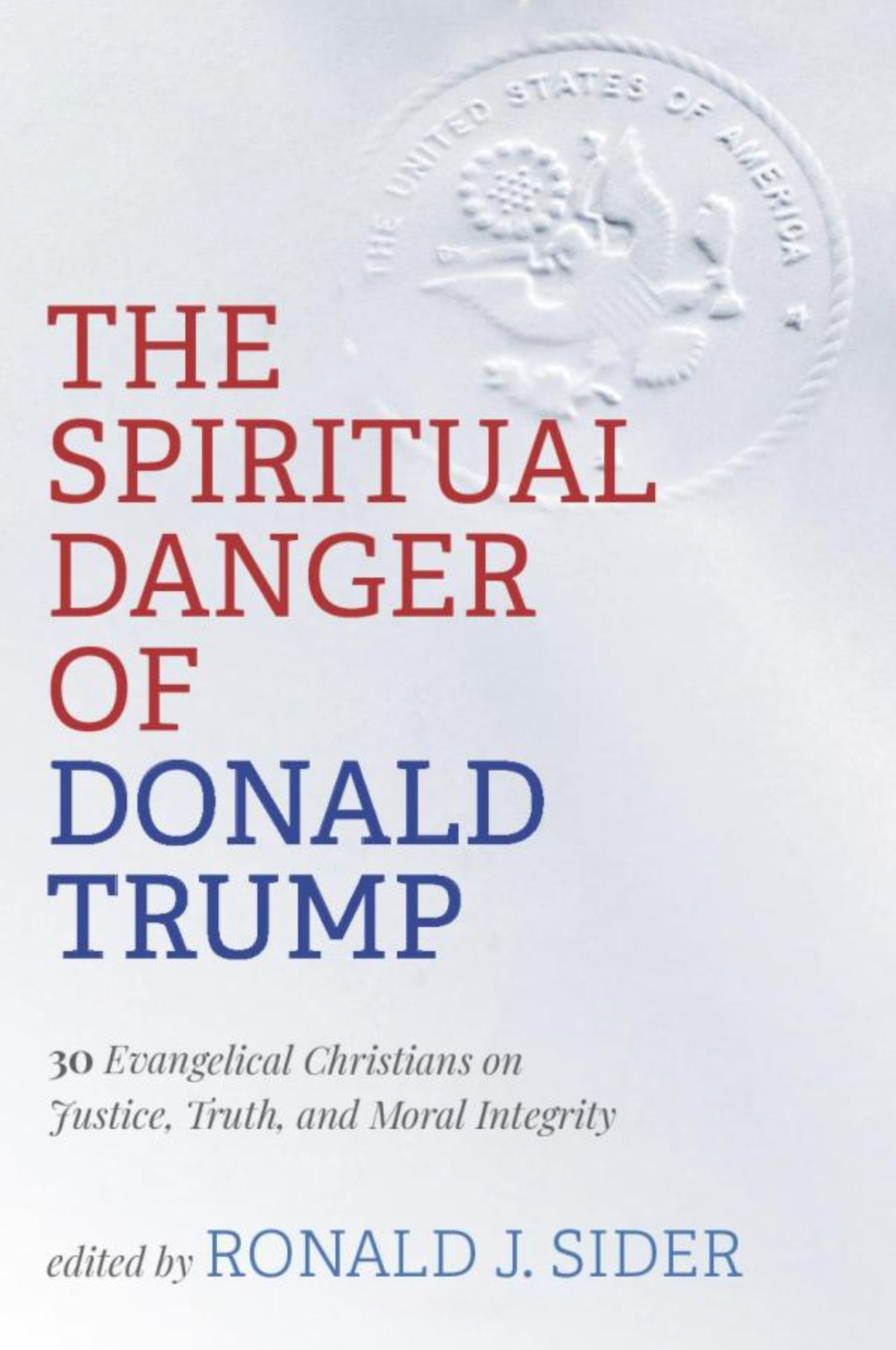The Spiritual Danger of Donald Trump: 30 Evangelicals on Justice, Truth, and Moral Integrity
Edited by Ronald J. Sider (Cascade Books)
While a title seeming to disparage Donald Trump likely is enough to stop many from reading a review of the book, there are some essays included among the 25 that even supporters of Trump might appreciate.
Given the title, no one will be surprised that the writers do not support the re-election of Trump in 2020. Some even make an explicit plea against voting for him in November. Bracketing out their clear bias, some essays—in particular those written by self-identifying religious and political conservatives—provide thoughtful reflection.
Three cautions are in order. Readers will need to get past the essay titles, as they seem intended to provoke more than to draw the reader into the stated intent of reasoning together. Some of the writers are not particularly charitable toward Trump. Because the writers quote Trump directly, many essays contain his explicit and offensive language.
Most essays in this collection attempt to hold up the words and actions of Donald Trump against the virtues and tenets held by evangelical Christians. The argument of most contributors is less about whether a person should vote for Trump but whether evangelical Christians will hold him accountable for the ways in which he contradicts their and his own stated Christian values.
Amid the repeated litanies of Trump’s offenses is the worthwhile counsel that if evangelicals re-elect Donald Trump as president even while disagreeing with the ways he violates basic Christian values, then those same evangelicals must be ready to hold him accountable rather than defend him.
Much of the content is up to date, commenting on Trump’s statements and actions right up to February 2020. Due to be released June 1, most essays do not speak to the events of the coronavirus pandemic during March, April and May.
The middle section of essays contains the most interesting points of discussion.
D Zac Niringiye recounts a conversation in Uganda with a woman from Burkina Faso. She likes Trump because he “is like a mirror … a reflection of the society that voted him into power.” For her, Trump offers Americans and American evangelicals the chance to see themselves as they really are.
Stephen Haynes responds to those evangelicals who identify with Dietrich Bonhoeffer’s activism before and during World War II by claiming they ignore his real concern, which was the church conforming to a political party.
Sign up for our weekly edition and get all our headlines in your inbox on Thursdays
George Yancey, professor of the social sciences at Baylor University, suggests supporting Trump is dangerous pragmatically. Evangelicals who support Trump may win some battles while losing the war. His concern is that Christians as a whole may become associated with racism, sexism, lying and other sins because of evangelical Christian support for Trump.
For Yancey, the way forward for Christians is through culture, not political power. Since in the United States, laws tend to follow culture, evangelicals reacting to “Christianophobia” would be more strategic to win over culture than to seek political power.
The essays in the first part are those least likely to change any Trump supporter’s mind. They recite the numerous charges against him, including accusations of sexual assault and actual sexual and financial improprieties, bullying and ridiculing, racism, pride and lying.
Despite knowing these things about Trump well in advance of the 2016 presidential election—and railing against similar faults in Bill Clinton decades before—evangelicals overwhelmingly voted for Trump in 2016.
Though Trump supporters’ minds are not likely to be changed by essays in the first part, Christians of varying political persuasions surely can agree on concerns raised in some of those essays.
Vicki Courtney exhorts Christians to consider Trump’s language about women. Her concern is the objectification of women—regardless who is doing the objectifying—and how that will affect culture and culture’s view of Christians who do not speak out against such objectification.
Napp Nazworth, who identifies himself as “a theologically conservative evangelical Christian” and “a political conservative,” charges Trump with promising white evangelicals the same kind of prominence and power Satan promised Jesus. His concern is with Christians seeking protection from a human being rather than from Jesus. For Nazworth, the problem is not electing Trump as president but is in defending his words and actions.
Michael Austin states he wants every American president to succeed. In reflecting on the lack of humility in Trump’s words, Austin writes, “The problem is that the vice of pride has the potential to hinder not only Trump’s success in office, but the well-being of” others.
The third part delves into underlying theology, history and legal philosophy and requires more patient reading than the first two sections.
Stephen Meyer criticizes Democrats and Republicans as looking backward rather than facing the world as it is. He does not see the comparison of Trump to Hitler as legitimate for several reasons, one being “the economic situation” in the United States “is far from the desperate conditions that plagued Germany” in the 1930s. Meyer wrote prior to economic downturn resulting from the coronavirus pandemic.
Christopher Hutchinson, a pastor in the Presbyterian Church of America, provides perhaps one of the most interesting essays for conservative readers to consider. He and his father are military veterans, he received Jesus as his personal Savior, he opposed Bill Clinton and opposes the “scourge of widespread abortion,” and he “weathered the 1990s by listening to increasing amounts of Rush Limbaugh and celebrating the rise of Fox News.”
Calling for unity among Christians of varying political persuasions, Hutchinson writes, “If anything, the New Testament enjoins a conservative yet prophetic posture towards our surrounding culture, as we call out a society’s sins, seeking change by persuasion and internal reform rather than by force or fiat.”
Ron Sider concludes the collection with practical suggestions for how Christians who hold similar faith convictions but who differ on Trump can come together around what they hold in common.
Readers who support Donald Trump and who advocate for his re-election in 2020 likely will wonder why the Baptist Standard published a review of The Spiritual Danger of Donald Trump while not also publishing a review of a book detailing his spiritual advantages. If such a book is written, it will be welcomed for review in the Standard.
Eric Black, editor
Baptist Standard
















We seek to connect God’s story and God’s people around the world. To learn more about God’s story, click here.
Send comments and feedback to Eric Black, our editor. For comments to be published, please specify “letter to the editor.” Maximum length for publication is 300 words.